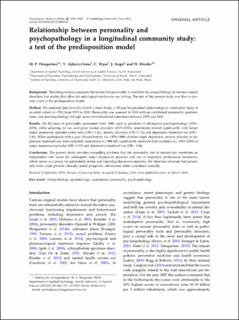Please use this identifier to cite or link to this item:
https://doi.org/10.21256/zhaw-2272Full metadata record
| DC Field | Value | Language |
|---|---|---|
| dc.contributor.author | Hengartner, Michael Pascal | - |
| dc.contributor.author | Ajdacic-Gross, Vladeta | - |
| dc.contributor.author | Wyss, Christine | - |
| dc.contributor.author | Angst, Jules | - |
| dc.contributor.author | Rössler, Wulf | - |
| dc.date.accessioned | 2018-01-30T13:17:23Z | - |
| dc.date.available | 2018-01-30T13:17:23Z | - |
| dc.date.issued | 2016-06 | - |
| dc.identifier.issn | 0033-2917 | de_CH |
| dc.identifier.issn | 1469-8978 | de_CH |
| dc.identifier.uri | https://digitalcollection.zhaw.ch/handle/11475/2272 | - |
| dc.description | Erworben im Rahmen der Schweizer Nationallizenzen (http://www.nationallizenzen.ch) | de_CH |
| dc.description.abstract | Mounting evidence supports the notion that personality is crucial in the aetiopathology of common mental disorders, but studies that allow for aetiological conclusions are lacking. The aim of the present study was thus to provide a test of the predisposition model. We analysed data from the Zurich Cohort Study, a 30-year longitudinal epidemiological community study of an adult cohort (n = 591) from 1979 to 2008. Personality was assessed in 1988 with an established personality questionnaire, and psychopathology through seven semi-structured interviews between 1979 and 2008. On the basis of personality assessment from 1988, used as predictor of subsequent psychopathology (1993-2008), while adjusting for sex and prior mental disorders (1979–1988), neuroticism related significantly with future major depression episodes [odds ratio (OR) = 1.41], anxiety disorders (OR = 1.32) and depression treatment use (OR = 1.41). When participants with a past 10-year history (i.e. 1979-1988) of either major depression, anxiety disorder or depression treatment use were excluded, neuroticism in 1988 still significantly predicted first incidence (i.e. 1993-2008) of major depression episodes (OR = 1.53) and depression treatment use (OR = 1.84). The present study provides compelling evidence that the personality trait of neuroticism constitutes an independent risk factor for subsequent major depression episodes and use of respective professional treatments, which serves as a proxy for particularly severe and impairing depression episodes. We therefore advocate that personality traits could provide clinically useful prognostic information when considered carefully. | de_CH |
| dc.language.iso | en | de_CH |
| dc.publisher | Cambridge University Press | de_CH |
| dc.relation.ispartof | Psychological Medicine | de_CH |
| dc.rights | Licence according to publishing contract | de_CH |
| dc.subject | Aetiopathology | de_CH |
| dc.subject | Epidemiology | de_CH |
| dc.subject | Neuroticism | de_CH |
| dc.subject | Personality | de_CH |
| dc.subject | Psychopathology | de_CH |
| dc.subject.ddc | 155: Differentielle Psychologie und Entwicklungspsychologie | de_CH |
| dc.subject.ddc | 616.89: Psychische Störungen, klinische Psychologie und Psychiatrie | de_CH |
| dc.title | Relationship between personality and psychopathology in a longitudinal community study : a test of the predisposition model | de_CH |
| dc.type | Beitrag in wissenschaftlicher Zeitschrift | de_CH |
| dcterms.type | Text | de_CH |
| zhaw.departement | Angewandte Psychologie | de_CH |
| zhaw.organisationalunit | Psychologisches Institut (PI) | de_CH |
| dc.identifier.doi | 10.1017/S0033291716000210 | de_CH |
| dc.identifier.doi | 10.21256/zhaw-2272 | - |
| zhaw.funding.eu | No | de_CH |
| zhaw.issue | 8 | de_CH |
| zhaw.originated.zhaw | Yes | de_CH |
| zhaw.pages.end | 1705 | de_CH |
| zhaw.pages.start | 1693 | de_CH |
| zhaw.publication.status | publishedVersion | de_CH |
| zhaw.volume | 46 | de_CH |
| zhaw.publication.review | Peer review (Publikation) | de_CH |
| zhaw.webfeed | Klinische Psychologie | de_CH |
| Appears in collections: | Publikationen Angewandte Psychologie | |
Files in This Item:
| File | Description | Size | Format | |
|---|---|---|---|---|
| 2016_hengartner-etal_relationship-between-personality-and-psychopathology_PsyMed.pdf | 233.46 kB | Adobe PDF |  View/Open |
Show simple item record
Hengartner, M. P., Ajdacic-Gross, V., Wyss, C., Angst, J., & Rössler, W. (2016). Relationship between personality and psychopathology in a longitudinal community study : a test of the predisposition model. Psychological Medicine, 46(8), 1693–1705. https://doi.org/10.1017/S0033291716000210
Hengartner, M.P. et al. (2016) ‘Relationship between personality and psychopathology in a longitudinal community study : a test of the predisposition model’, Psychological Medicine, 46(8), pp. 1693–1705. Available at: https://doi.org/10.1017/S0033291716000210.
M. P. Hengartner, V. Ajdacic-Gross, C. Wyss, J. Angst, and W. Rössler, “Relationship between personality and psychopathology in a longitudinal community study : a test of the predisposition model,” Psychological Medicine, vol. 46, no. 8, pp. 1693–1705, Jun. 2016, doi: 10.1017/S0033291716000210.
HENGARTNER, Michael Pascal, Vladeta AJDACIC-GROSS, Christine WYSS, Jules ANGST und Wulf RÖSSLER, 2016. Relationship between personality and psychopathology in a longitudinal community study : a test of the predisposition model. Psychological Medicine. Juni 2016. Bd. 46, Nr. 8, S. 1693–1705. DOI 10.1017/S0033291716000210
Hengartner, Michael Pascal, Vladeta Ajdacic-Gross, Christine Wyss, Jules Angst, and Wulf Rössler. 2016. “Relationship between Personality and Psychopathology in a Longitudinal Community Study : A Test of the Predisposition Model.” Psychological Medicine 46 (8): 1693–1705. https://doi.org/10.1017/S0033291716000210.
Hengartner, Michael Pascal, et al. “Relationship between Personality and Psychopathology in a Longitudinal Community Study : A Test of the Predisposition Model.” Psychological Medicine, vol. 46, no. 8, June 2016, pp. 1693–705, https://doi.org/10.1017/S0033291716000210.
Items in DSpace are protected by copyright, with all rights reserved, unless otherwise indicated.